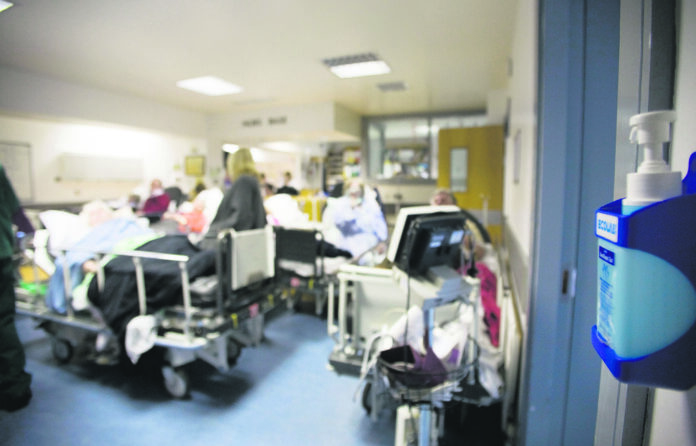
TODAY marks the 100th consecutive weekday in which University Hospital Limerick has more admitted patients on trolleys waiting for a bed than any other hospital in the country, according to figures published in the Irish Nurses and Midwives Organisation’s (INMO) Trolley Watch.
And with the demands on the Emergency Department (ED) rising almost every day, a Limerick TD has learned that money ran out this week for grants which would convert and equip patients’ homes so that they could leave hospital and nursing home care, freeing up beds.
Deputy Maurice Quinlivan (SF) has consistently raised the issue of overcrowding in the Dooradoyle hospital and said the grim 100-day streak is “shocking but not surprising”.
‘Budget has run out’
Deputy Quinlivan told the Limerick Post that the “whole health system needs to be looked at”.
“I’ve been told of many cases where people who could manage at home if their bathrooms were done or stairlifts were installed, but I’m told this week that the budget for this kind of work has simply run out.
“We also need proper homecare packages. Thousands of hours of home help have been approved but there are no staff to do those hours because they’re not being paid properly.
“Community care has to be looked at. Some people can’t even get a GP so they go to the ED when there may be no need to do that, which adds to the problems.”

The Sinn Fein TD accused Health Minister Stephen Donnelly of taking a “hands off approach”.
“Getting extra hospital beds is welcome, but it will not meet the growing demand in the region. That demand is only going one way and the facilities just can’t cope, despite the very best efforts of staff.
“You can’t channel three EDs (in St John’s, Nenagh, and Ennis hospitals – which have been closed for a number of years) into one and not have a huge issue.”
238 patients every working day
In response to a query from the Limerick Post on the 100th day of overcrowding, a spokesman for UHL noted that “provisional data shows that in the 100 weekdays (i.e., not including Saturdays and Sundays) between Friday May 19 and Thursday October 5, a total of 23,765 patients attended the ED at UHL. On average, this means that 238 patients presented for emergency care every working day.”
Pointing out that the INMO trolley figures are not counted at weekends, the spokesman said: “The total daily ED attendance, including weekends, between May 19 and October 5, was 30,970; a daily average of approximately 221 patients.”
“For broader context on patient flow, it should be noted that this does not include the 7,205 patients who attended ED on Saturdays and Sundays during the same period (an average weekend daily attendance of 180).
Trolley numbers were the catalyst that sent 11,000 people out to march on the streets of Limerick in January, demanding better services for patients and their families in the Mid West.
Among those who marched were family members of Aoife Johnston and Eve Cleary, young women who died while in the ED at University Hospital Limerick.

Other protesters were there to highlight the hardships suffered by themselves or loved ones during long waits for admission through the ED.
The Mid West Hospital Campaign also marched to demand the re-opening of EDs at St John’s, Ennis, and Nenagh hospitals.
The INMO has repeatedly warned that high trolley numbers and long waits are a serious danger to patients, and that overcrowding is a hazard to staff and a massive contribution to stress and burnout among clinicians.
‘Not the standard of care we wish to provide’
Further commenting on the 100-day run as most overcrowded hospital in the country, the UHL spokesman said: “This is not the standard of care that we wish to provide, and we apologise to all patients, and their loved ones, who have been impacted by long waits.”
“We also commend our hard-working healthcare professionals for their diligent efforts to care for patients in these less than optimal circumstances.
“As stated in the September 2022 Deloitte report on patient flow in UL Hospitals Group, the shortfall in the Mid West of inpatient bed capacity is the main driver of hospital overcrowding, and the problem of overcrowding will continue until there is a substantial increase in bed capacity here.
“The Deloitte report identified a requirement for 302 additional inpatient beds and 63 day beds in this region by 2036.
“We welcome the very visible progress currently being made by contractors on the next phase of bed development at UHL – the 96-bed block adjacent to the Emergency Department (ED).
“UL Hospitals Group reiterates its gratitude for the support of national HSE and government for this work, for the second 96-bed block that is currently in planning, and for the great strides made during the pandemic in expanding and upgrading the bed and service capacity in UHL and across the Group.
“However, until the additional bed capacity comes on stream, our management and staff must continue to provide care to increasing numbers of patients within the constraints outlined above.
“For almost two years, staff at UHL have been managing significantly elevated numbers of patients attending this hospital’s Emergency Department.
Daily ED attendances have grown steadily and substantially over the past four years both in UHL and across Ireland, requiring healthcare teams to constantly balance the increasing demand for emergency care against the needs of patients, and of those who are waiting for surgery.
According to the UHL spokesman, the daily average ED attendance in 2019 was 195, a stark contrast to the current figure of 238.
The significant increase in ED presentations frequently results in admitted patients experiencing significant waits for hospital beds, or, during periods of particularly marked demand for emergency care, deferral of elective surgery and other scheduled activity in UHL and other hospitals in the Group, the hospital spokesman explained.
“Deferral of scheduled activity is an action of last resort, and day to day, staff at all levels across UL Hospitals Group are working hard to reduce wait times for inpatient beds and provide safe care across all our services
“We continue to follow our Escalation Framework to reduce pressure on the ED and improve patient flow across our sites.
“Specific measures being taken include the opening of surge capacity in UHL and across all sites; transfers of patients on trolleys in ED to our inpatient wards; additional ward rounds by medical teams to expedite discharges or to identify patients suitable for transfer to Ennis, Nenagh and St John’s Hospitals; and close collaboration with our colleagues in HSE Mid West Community Healthcare in order to expedite discharges.
“The Framework also provides for reductions of scheduled care when demand for emergency care is at a peak.”
Meanwhile, there has been movements online among Limerick cohorts to spur on another mass protest against the conditions at UHL, similar to the 11,000-strong scenes witnessed earlier this year.









